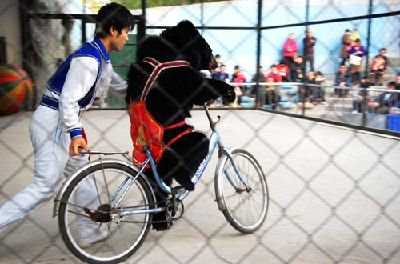Animal live show ban nears
End of training
After enjoying the bears' performance, Xiang Xiaohui and her parents were shocked when China Daily reporters told them about the forthcoming ban. They were not the only ones.
 |
|
A black bear rides a bicycle as part of a show at Zhengzhou Zoo. The shows will be banned from January. |
In Puyang, Henan's so-called "city of animal training", many people are also struggling to understand why their profession is being outlawed.
"Why is the regulation so one-size-fits-all?" asked Shi Huaimin, 46, a native of the city who heads the team of trainers at Zhengzhou Zoo. "Taming animals is a cultural phenomenon that has existed in Puyang for six, seven decades.
"If we can't perform, there may be no way to protect this heritage and it could disappear entirely," he warned.
The city, which sits on the northern shore of the Yellow River, has been famous for its animal trainers since the Qing Dynasty (1644-1911). As residents were unable to grow much on its sandy, barren lands, large numbers were forced to make a living as entertainers, traveling China with monkeys, camels and even dogs. Today, it is a pillar industry that involves more than 400 villagers.
Liu at the Chinese Association of Zoological Gardens said that, although the ban will be tough on communities in Puyang, it is in keeping with "the global consensus that animal performances shouldn't be allowed".
Shi and his team started running the shows at Zhengzhou Zoo in September 2009 after moving from Wuhan, capital of Hubei province.
Performances were originally twice a day, seven days a week, but as the troupe's popularity grew, the number was increased to four a day.
In August this year, an inspection team from the State Forestry Administration ordered the park to cancel two shows - one in which tigers jump through flaming rings, the other involving bears playing with fire sticks - as they feared they "may be harmful to the animals".
The team cancelled the shows but Shi denied any of his animals are mistreated.
"If my son is sick, my wife can take him to the hospital. But if one of the animals gets sick, I immediately come back because these animals are what we live on," he said, his eyes filling with tears.
However, as it is the trainers and not zoos that usually own the performance animals, that bonus could soon become a burden.
"It's impossible to sell these animals and there will be no places where we can make money now," said Shi, who explained that food for 10 animals can cost roughly 900 yuan a day. "How are we going to make this money?
"It's clearly impossible to perform on the streets or in villages, and now we're banned from parks and zoos. All our opportunities have been cut off," he added.
 0
0 






